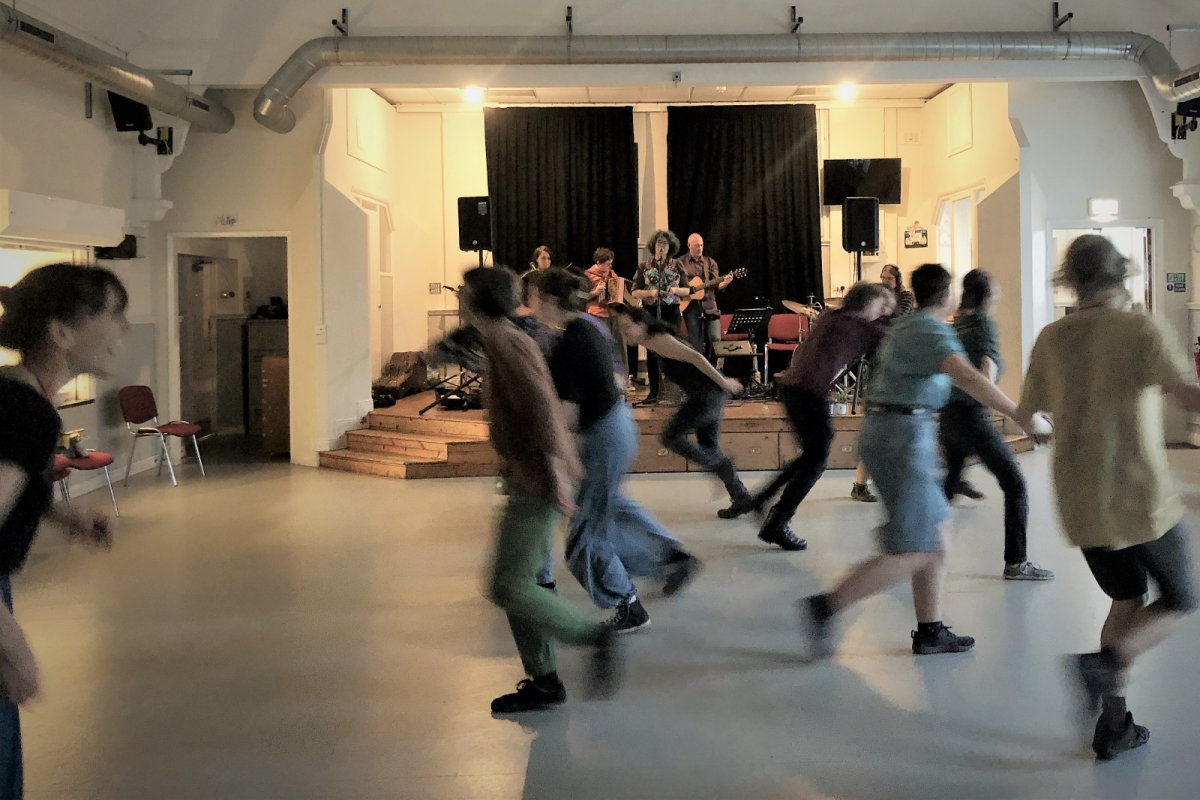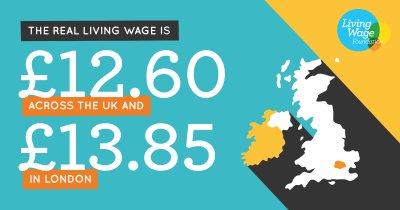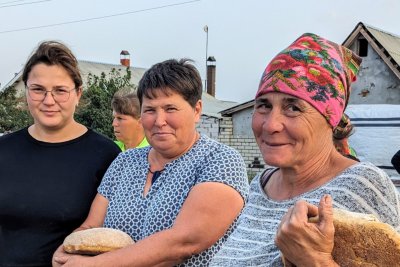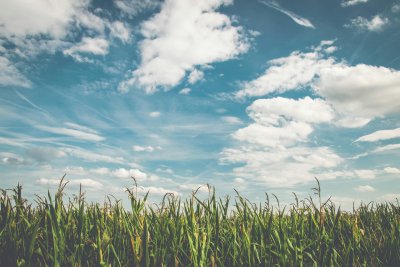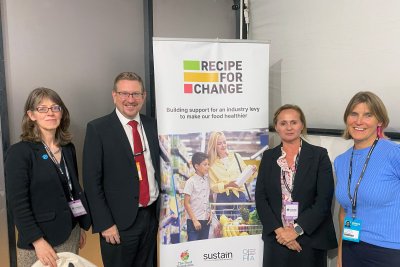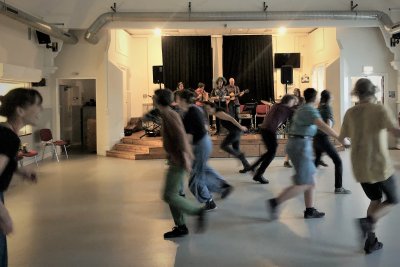 Ceilidh at the Land Justice Spring Gathering. Credit: Shared Assets
Ceilidh at the Land Justice Spring Gathering. Credit: Shared Assets
How to Build a Land Justice Movement
If we are to hope for real land justice in the UK in terms of systemic reforms in housing, farming, industry and public land access, then we need a coalition of organisations leading us towards a common vision. The Land Justice Spring Gathering – organised by Shared Assets – brought such organisations into the same room to come up with some unexpected and thought-provoking results.
As a representative of Sustain's Fringe Farming project, I was invited to the Land Justice Spring Gathering, which took place over the weekend of 19-21 May in Victoria Hall, Sheffield. The South Yorkshire city welcomed us participants from across the country with full sunshine rolling off its hills.
It was organised and led by Fringe Farming partner, Shared Assets, with facilitation by Navigate Coop. Over 40 organisations were represented, each working in their own pocket within the land justice movement, such as housing and reparations. The Fringe Farming project takes its lead from agroecology, as a peasant movement for food justice, and advocates for the importance of localised food growing and how it needs to serve communities and the environment. It particularly explores how public land and other government resources can be mechanisms for unlocking these opportunities.
The main thrust of the gathering was to find out if the many disparate organisations and approaches to land justice could come together on intersectional points and begin to collectively take a systemic perspective.
Being plugged into a systems view on something as all-encompassing as land justice ensures that the Fringe Farming project, and Sustain as a whole, can appreciate the wider context and network of its work, while giving it a greater depth of meaning. In isolation, no matter how much we do, the best we can hope for are incremental gains that run the risk of not being sustained. On the other hand, if we can make systemic shifts as part of a much bigger whole, then we practically guarantee long-term positive transformations.
What realistically can be done about land justice?
You would be forgiven for thinking that the obstacles to land justice are insurmountable. Besides building more houses, the Government and party politics generally seem incapable and/or unmoved towards substantial land reform. This has neatly been exposed by the Right to Roam campaign coupled with the last vestige of wild camping in England, Dartmoor, succumbing to a High Court ruling in January this year.
This follows a historical lock-in that has concentrated land ownership to the few, which is made only more shocking in the case of Scotland, where more than half of the land is owned by fewer than 500 people. And this is to show how the state of land ownership is a startling exposé of rampant economic inequalities in the UK.
So, given the odds stacked against major land reform for land justice, did the gathering degenerate into fatalism?
The original schedule for the weekend was largely set aside as participants took more control of proceedings. This came about due to a few factors, not least because a lot of the people at the gathering were themselves facilitators or otherwise were organisers, and so had their own ideas about how to run a discussion and were shown to be more than capable of doing so. Another crucial factor was the work involved for building trust and approaching a unified identity. This showed that although a room of people can come together for a broadly common cause and likely share a lot of the same values, it is always important to see differences. Even before a shared vision for a movement is nurtured, defining a group needs to be deliberated, negotiated and fairly decided.
Hence, judging by the outputs, there was not much substance to be optimistic about, but this is probably an unfair way to evaluate a weekend workshop with a lofty vision of building a coalition of changemakers with a collective strategy. Regardless of what may be delivered as a result (directly or otherwise) of the gathering, two valuable things to come out were the realisation that a large group of radical voices with their own agendas can come together in trust and solidarity, and the richness of learning that accompanied the process.
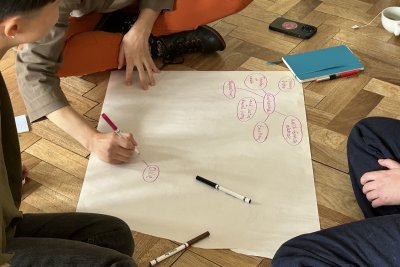
Lessons included how to make space for emotions and taking them seriously rather than limiting conversations to rational discourse. Expressions of anger and attempts at subversion by breaking restrictions drew out something less tangible perhaps but nonetheless valid. It could be taken as an acknowledgment of the tangled myriad of injustices, historical and current, captured by land use and ownership in UK (and beyond), with a defiant call for action that would be absent from what could otherwise be called intellectual cynicism.
The participant-led session on decolonialism, anti-racism and reparations was a discussion that a lot of the participants wanted, or perhaps even needed, to have. Prior to voicing these tenuous subjects in a self-organised space, they seemed to hang in the air and block people coming together and crucially building trust. This created a level of catharsis to allow in solidarity and allyship.
It makes sense that building trust and solidarity is the first step to creating a movement. Ritual as a feature, or what could more coldly be called a tool, of facilitating multi-interest group interactions cropped up several times. The gathering was opened and closed by intention setting to the trance-inducing beat of a drum with eyes closed. It felt like it aimed at some higher force, perhaps our collective power, which trade union movements have shown can’t be underestimated.
Relatedly, I observed a convergence of what used to be separate approaches (and crowds) in environmentalist movements: the hippie-inflected spiritualists and the anarchist-leaning activists. Although diverse, participants generally were moved to dismantling the status quo and unjust systems, while recognising that an important component of this work is internal and requires a new way to relate to each other and the world around us. This seemed especially true with those who were younger.
One thing this could mean for land justice is that there may be a trend towards doing away with binaries and rather having lines blurred by celebrating diversity and mutual learning. We may see a plurality of voices communicating different ideas of what a better world looks like but organised as a cooperative unit. I think this can be effective only if the demands are common. Otherwise, such a movement breaks down to internal squabbling and breakaway fractions that weaken any collective power that has been built.
What does this mean for our activities and events?
Reflecting on the layers of complexity that the Land Justice Spring Gathering had to delicately wade through, it made me think about my workplace, Sustain. As an alliance of over a hundred member organisations geared towards better food and farming systems, it has its work cut out when it comes to finding ways to work as a coalition in a way that is truly collective and cooperative.
In a more broadly applicable sense, it was clear that there is plenty of room to change how workshops are generally run. For example, can we implement ritual and value emotions more? Participants (and facilitators) each carry their own struggles and traumas, and if we don’t address these, we open the opportunity for them to replicate themselves in a group setting and stand in the way of forming new, healthier relationships. This was evident in the gathering’s mutinous scrapping of the schedule to fit in a fishbowl conversation on decolonialism, anti-racism and reparations.
Furthermore, in an unexpected but real way, bonds were further solidified by a ceilidh. The childlike joy that transpired from holding hands and swinging people around overcame any remaining hints of distrust or even unfamiliarity. Not that ceilidhs should be universally adopted for movement building (although consider me a convert), but this kind of icebreaker can have a real purpose. Even if I appreciate that some people are allergic to them, there is something to be said for communicating important information by relating to each other in our bodies and not just by our words.
Another important question that arose out of the gathering is: how can we encourage diversity as a means for us to learn from one another and collectively become more intelligent? As the Land Justice Spring Gathering proved, a good starting point would be to invite many marginalised voices – as in the case of younger people of colour that came – into the room, not to shy away from conflict and to ensure expert and experienced facilitation.
In the same way that many of us have had meetings about planning meetings, the gathering was full of talks about how to best talk. Those wanting to get on with the substantive stuff – the organising, strategising and implementing plans – may be rolling their eyes but the weekend made clear that sometimes there needs to be more conversation and less action.
As one participant asked in how to make a ‘movement’ become a ‘Movement’, it seems that slowing down even to a standstill sometimes needs to happen before walking/marching. A Movement needs to be unified and be able to identify itself before anything can get started. And the Land Justice Spring Gathering showed that something as messy and hard to pin down as human relations and a sense of identity are at the heart of this.
Find out how the Fringe Farming project is working towards land justice
Sustain: Sustain The alliance for better food and farming advocates food and agriculture policies and practices that enhance the health and welfare of people and animals, improve the working and living environment, enrich society and culture and promote equity.
Sustain
The Green House
244-254 Cambridge Heath Road
London E2 9DA
020 3559 6777
sustain@sustainweb.org
Sustain advocates food and agriculture policies and practices that enhance the health and welfare of people and animals, improve the working and living environment, promote equity and enrich society and culture.
© Sustain 2024
Registered charity (no. 1018643)
Data privacy & cookies
Icons by Icons8
